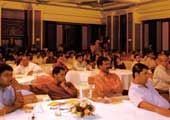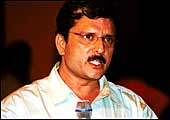 |
| Dead or alive: Advertising honchos Madhukar
Kamath (L) or Mudra and iran Khalap of chlorophyll debate the
demise of the advertising startup |
The
Taj lands end is an appropriate place to discuss start-ups, but
Crossfire moderator Suhel Seth had something else on his mind. "Bombay's
weather is like Bollywood actresses," he observed, "It's
more about the tease than about the act." With only a little
further ado, though, he got to the evening's debate-sponsored by
Royal Challenge in association with Liberty.
'The advertising start-up is dead.' Madhukar
Kamath, CEO of Mudra, stood for the motion, and Kiran Khalap, founder
of chlorophyll, a recent start-up, stood against. "The exercise,"
Seth warned, "is meant to be violent intellectually."
Kamath opened his assault by accusing BT editor
Sanjoy Narayan of setting him up-putting him up against a start-up
man as good as Khalap, and that too with another famous start-up
man as moderator. After that, he gave the audience an aerial view
of the Indian ad start-up graveyard-with MCM's tombstone shining
brightest. The 1970s and 1980s saw brilliant start-ups, he recalled,
but the 1990s saw the multinationals take charge. "Name me
one agency in the last five years that has made a significant difference
as far as Indian advertising is concerned," he challenged,
"None."
Kamath's proffered reason: a global change in
the very industry. "... it's no longer advertising." It's
a much broader field, calling for a new range of skills. "What
you require are communication start-ups," he argued, "idea
start-ups." But, alas, youngsters of such verve and dynamism
just aren't coming in as they did a generation before, and that's
the problem. "The people who can really do genuine start-ups
and make a genuine difference," Kamath alleged, "are no
more there in the industry." Going nostalgic, he added that
the fun decade was the 1980s, "with new agencies popping up
and major tectonic changes happening." The 1990s were slower.
And this decade? "This decade has been pretty boring. You keep
doing the same thing again and again."
"Start-up people are built differently,"
agreed Seth, pointing to 'risk-taking' as a rare ability in the
industry, and then letting Khalap have his say.
Khalap, however, wanted a series of clarifications
on what exactly this 'start-up' was that was being pronounced dead.
"The start-up is dead. It's like saying anyone who invents
the fabulous ghoda-gadi is dead. That's correct, because there's
no point inventing a new ghoda-gadi." Further, by way of rebuttal,
he asked, "Are we saying the notion of a start-up, the notion
of one man who'll stand up and say, 'I have a different belief and
I'll follow it to the end of the earth'... is that notion dead?"
The intention of a start-up, he made quite clear, was not to do
what had been done before. So if it's about whether a start-up can
start in 2004 and succeed... Khalap's answer was 'yes'.
 |
| From all corners: The audience displayed
a healthy interest in the survival of the advertising start-up,
as the sparks flew |
 |
| Interactive deliberations: The Q&A
session, with questions from advertising execs like V. Ramani,
CEO, Mediaturf Worldwide, enlivened the debate |
"Any start-up that has stuck to what it
believes in, has had enormous impact," argued Khalap, citing
among his examples an Amsterdam agency called Strawberry Frog, which
is not just another agency. "They believe that they can do
advertising sitting in Amsterdam because all their employees are
multinational. So at any given point of time, you'll have one Tunisian,
one Indian and one American. Whenever a person has had one single
principle to stick to, the start-up has survived. It has had disproportionate
impact." Describing regular multinational agencies that follow
"Mr. Coke and Mr. Nestle" around the world as "deliverers
of tips", Khalap argued that truly differentiated agencies
are those that are not part of the manufacturing paradigm. "For
God's sake, we are not a manufacturing industry. We're not even
a service industry. I don't know what we are." An idea industry,
he contended, could not really be run like a sprawling business
empire. Because ideas come from individuals, and individuals with
ideas do not happily take to being part of some big corporate machine.
They want freedom.
With that began the counter-jabs and audience
questions. Someone wanted to know how Khalap's little outfit meets
360-degree branding demands of clients, to which he replied quite
simply: by not working for them, by being choosy. Another questioner
wanted to know how important creativity was to the client relationship,
to which Kamath responded by placing it right on top as a business
priority.
The purpose of a start-up remained the evening's
theme. "The intention is to make a differentiated offering,"
said Kamath, in an attempt to modify Khalap's notion of intent.
This gave Seth the chance to intervene, which he did by knocking
down the start-up dream of "changing the world". Making
money is just as good a motivation as any, he said. "Why do
we need to have start-ups in a defined image?"
|
